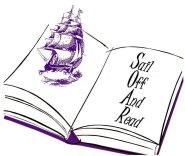Sail Off And Read - SOAR

SOAR is an early literacy project of the Polson School District designed to encourage parents of newborns to start reading to their babies from the moment they are born.
Every mother who gives birth at St. Joseph’s Hospital will receive a book bag filled with gently-used picture books, information on the benefits of early literacy, a new nursery rhyme book and an informational DVD.
This project is sponsored by the Polson School District, the Delta Kappa Gamma society, local Rotary and Kiwanis organizations, St. Joseph’s Hospital, the Montana Children’s Trust Fund and the George W. Tabor Foundation.
| Babies are Born Learners | What You Can Do |
|---|---|
(from Building the Reading Brain by Patricia Wolfe and Pamela Nevills)
|
Newborn
Toddler
Preschooler
|
Community Support
Many thanks to the many people who donate books for this project as well as
Polson Rotary and Kiwanis organizations, Delta Kappa Gamma, St. Joseph's Hospital, the Public Health Nurses, Montana Children's Trust Fund and the George W. Taber Foundation.
Health and Nutrition
WIC- Women, Infant, and Children~ 883-4605
Polson Health Department ~ 883-7288
Tribal Health ~ 883-5541
Family Resources
Polson Developmental Preschool ~ 883-6333 ext 503
A preschool program run by the Polson School District for children ages 3-5 years old that qualify for special education.
Child Development Center ~ 883-2636
CDC provides services to families whose children have a diagnosed developmental disability or are considered to be “at risk” for delays in development.
Child Find- Polson School District ~ 883-6333 ext 503
Free Hearing, vision and learning disabilities screening for children and infants aged 0-5 years. All children in the area are invited to participate.
Little Cherries/ Lindy Learners~ 883-1173
Polson School District offers a free preschool program for 3 and 4 year-olds and their parents. Classes are held at Cherry Valley.
Literacy
Polson City Library ~ 883-8225 , Mother Goose Time - ages 1 - 3, Children’s Story Time - ages 3 - 5
